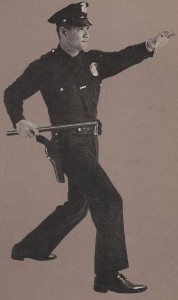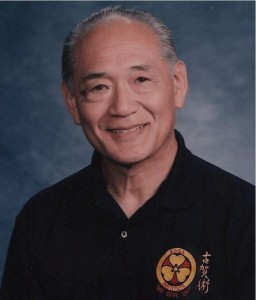Law enforcement officials throughout the state, nation and even the world are mourning the loss of police self defense instructor and pioneer Robert “Bob” Koga.
Koga, 83, died peacefully, surrounded by friends and family, Sept. 8 at his Fallbrook home. He had been battling mesothelioma.
His contributions to police self defense and crowd control techniques have changed the way law enforcement officers deal with dangerous situations from San Gabriel to Saudi Arabia.
“He was a special man in more ways than one,” said Charles Watts, who retired from the Pomona Police Department in 2002 at the rank of lieutenant after 30 years on the force.
Watts taught alongside Koga for 25 years, and is one of just over a dozen “core instructors” of the Koga Institute who continues to pass on Koga’s teachings to other law enforcement training officers.
“He’s a great loss to the law-enforcement profession,” Watts said. “This is a man who dedicated his entire life to the safety of law enforcement officers. He was second to none when it came to his will and desire when it came to having officers do things properly out there.”
“I trained with him for 35 years. He was more than just an instructor. He really cared about law enforcement as a whole,” Watts added.
 Koga personally taught his final class on his unique style of hand-to-hand combat, which was based on the Japanese martial art of Aikido, in Irvine in April, Watts said.
Koga personally taught his final class on his unique style of hand-to-hand combat, which was based on the Japanese martial art of Aikido, in Irvine in April, Watts said.
“He always joked that he was going to teach until he was 85,” Watts said.
Koga regularly spent 35 weeks every year traveling throughout the world and teaching his “Koga System,” he said.
When teaching police officers to defend themselves, He was one of the few that started with control first, control of the self,” Watts said. “You can’t control people in situations unless you’re in control of yourself first. He spent a lot of time teaching that.”
He taught not only physical combat and control techniques, but also “mental, psychological and emotional preparation.,” Watts said.
Police agencies all over the United States have adopted the Koga System.
In California alone, agencies that have officially adopted the Koga System include Long Beach police, Covina police, San Gabriel police, Pomona police, Glendale police, Irvine Police, Cathedral City police, Stockton Police, Chico police , the Tulare County Sheriff’s Department and the Kern County High School police, Watts said.
Koga has also trained officials including numerous SWAT teams, federal air marshals, Navy Seal team members, Army Delta Force members, the Royal Canadian Mounted Police, the Royal Brigade Guards of the King of Saudi Arabia, according to a statement issued by the Koga Institute. The Koga system is also used by agencies in Japan, China and Mexico.
Michael Grossman, who retired in January after 40 years with the Los Angeles County Sheriff’s Department with the rank of Chief of Homeland Security Division, first met Koga at a class in 1974.
He went on to become a dedicated student of Koga’s teachings, and taught the system himself for 17 years at Cerritos College in Norwalk.
Koga also taught at Cerritos College, as well as Pasadena City College, Rio Hondo College and California State University, Los Angeles.
“He was just an amazing man who made a huge difference in my career and my life,” Grossman said. “I will forever be grateful for my opportunity to know him and train with him.”
Grossman told of a SWAT captain who recently approached Grossman’s wife at a retirement dinner to tell her the Koga methods he learned from Grossman had saved his life during a wild fight with a suspect.
Through his teachings, Koga affected not only those who directly knew and trained with him, but thousands of other law enforcement officers who have been taught the Koga System instructors trained by Koga, Grossman said.
Though the Los Angeles County sheriff’s department never officially adopted the Koga system for it’s deputies, use of force procedures created by Grossman and others for the sheriff’s department in the early 1990s were “highly influenced” by Koga’s teachings.
Grossman said he first sought out Koga to improve his self-defense skills.
But after studying under Koga, “I learned more than I ever thought I would learn, not just about defense, but about life in general. How to effectively and respectfully deal with all kinds of people.”
“He reached so far beyond what any one person could do, it was incredible,” Grossman said.
Watts also said that the lessons he learned from Koga extended far beyond combat techniques.
Beyond being an unparalleled martial arts instructor, “Mr. Koga was like a father figure to me,” he said. “He was my mentor.”
“Robert had boundless energy, was a voracious reader and had a wide range of passionate interests,” according to the Koga Institute statement. “Perhaps surprising to many people, Robert was an avid fan of the historic American West. He enjoyed wearing western style clothing; he loved steer roping; he loved his horses and enjoyed riding the rough and rugged land. He would have been happy to have been born a cowboy 100 years ago.
Koga grew up in California’s East Bay before being sent to an internment camp at Topaz, Utah at the outset of WWII.
“It was here that he started his martial arts career, taking up Judo training to protect himself from the gangs that had formed within the camp,” according to the statement.
After the war, Koga went on to serve during the Korean War with the U.S. Air Force. He was wounded during the conflict.
And in 1955, Koga became one of the first Asian-Americans to be sworn in as a Los Angeles Police Department officer.
He became a self-defense instructor for the LAPD, during which time he started the nonprofit Koga Institute to teach his techniques in 1973.
Koga retired from the LAPD in 1979 and focused his efforts entirely on the institute. He’s written four books.
Though Koga is gone, his teachings and his legacy live on through the Koga Institute and the countless law enforcement officers whose lives he’s impacted, both directly and indirectly.
“It would be an absolute travesty if (his work) were to just fade away, and we’re not going to allow that to occur,” Watts said.
A memorial tribute to Koga is planned at 1 p.m. Nov. 2 at the Ontario Convention Center, Watts said.
PHOTOS of Robert “Bob” Koga courtesy of the Koga Institute

